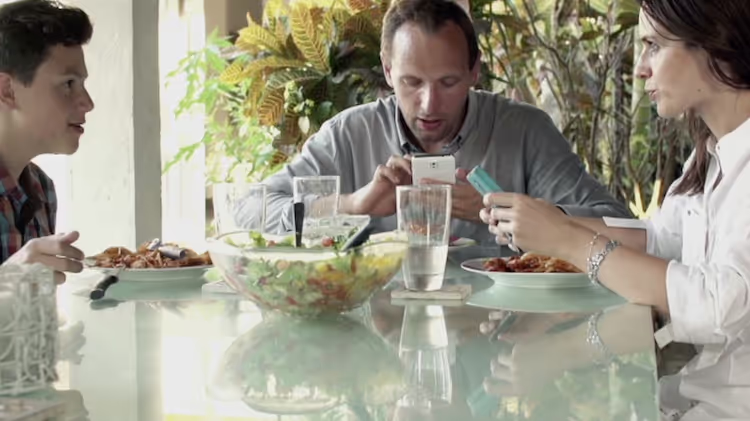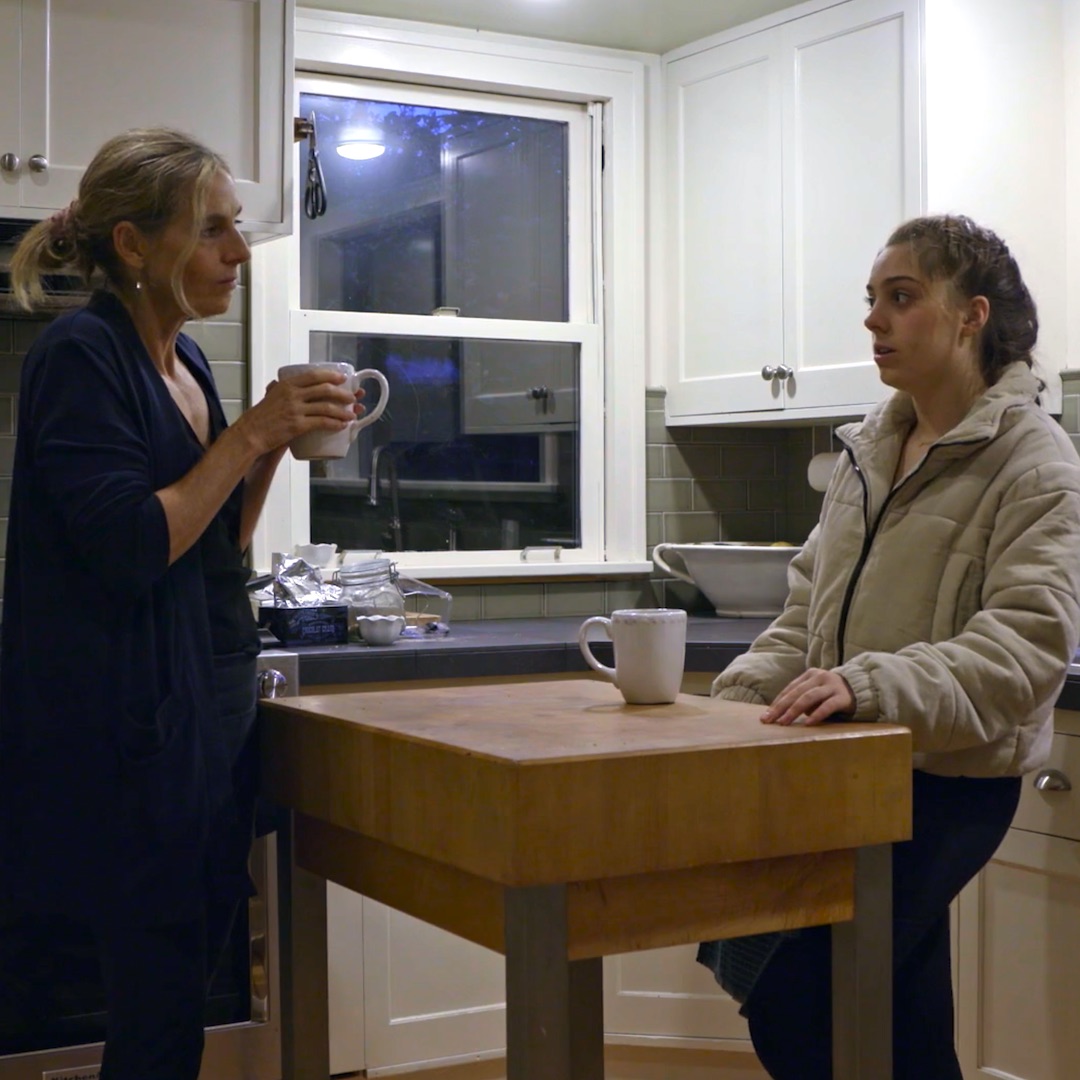


Kids aren’t the only ones glued to their screens. Parents get sucked into the little glowing light too.
Not one, but two studies, found something that I found surprising: the majority of parents believe they are good media-use role models for their kids. The American Psychological Association’s 2017 Stress in America survey found that 72% of parents somewhat or strongly agree that they model a healthy relationship with technology for their children. The other study was a 2016 Common Sense Media survey of 1,796 parents, which found that the large majority of parents (78%) believe they model good media habits for their kids.
Do our kids think we are good role models? When I ask audiences of students if they think their parents are on their devices too much, generally two-thirds of the kids raise their hands. The Common Sense Media survey above supports this point in that parents of tweens and teens report spending on average more than 6.5 hours a day on screens each day doing things like watching tv, social networking, browsing the internet, and video gaming.
When we say, “we want to model better,” it is like saying, “I am going to eat better,” a goal which is rarely attainable because it is too vague. A well-known fact about behavior change is that choosing a clearly definable goal, and setting things up for success around it, increases the chance for change that is noticeable and sustainable. Screen time allows us to model behavior change. My suggestion is to pick one thing you want to change about screen time use and share that with your kids or students.
Learn more about showing our movies in your school or community!
Join Screenagers filmmaker Delaney Ruston MD for our latest Podcast

Learn more about our Screen-Free Sleep campaign at the website!
Our movie made for parents and educators of younger kids
Learn more about showing our movies in your school or community!
Learn more about showing our movies in your school or community!
Join Screenagers filmmaker Delaney Ruston MD for our latest Podcast

Learn more about our Screen-Free Sleep campaign at the website!
Our movie made for parents and educators of younger kids
Join Screenagers filmmaker Delaney Ruston MD for our latest Podcast
As we’re about to celebrate 10 years of Screenagers, we want to hear what’s been most helpful and what you’d like to see next.
Please click here to share your thoughts with us in our community survey. It only takes 5–10 minutes, and everyone who completes it will be entered to win one of five $50 Amazon vouchers.
Kids aren’t the only ones glued to their screens. Parents get sucked into the little glowing light too.
Not one, but two studies, found something that I found surprising: the majority of parents believe they are good media-use role models for their kids. The American Psychological Association’s 2017 Stress in America survey found that 72% of parents somewhat or strongly agree that they model a healthy relationship with technology for their children. The other study was a 2016 Common Sense Media survey of 1,796 parents, which found that the large majority of parents (78%) believe they model good media habits for their kids.
Do our kids think we are good role models? When I ask audiences of students if they think their parents are on their devices too much, generally two-thirds of the kids raise their hands. The Common Sense Media survey above supports this point in that parents of tweens and teens report spending on average more than 6.5 hours a day on screens each day doing things like watching tv, social networking, browsing the internet, and video gaming.
When we say, “we want to model better,” it is like saying, “I am going to eat better,” a goal which is rarely attainable because it is too vague. A well-known fact about behavior change is that choosing a clearly definable goal, and setting things up for success around it, increases the chance for change that is noticeable and sustainable. Screen time allows us to model behavior change. My suggestion is to pick one thing you want to change about screen time use and share that with your kids or students.
Sign up here to receive the weekly Tech Talk Tuesdays newsletter from Screenagers filmmaker Delaney Ruston MD.
We respect your privacy.
Kids aren’t the only ones glued to their screens. Parents get sucked into the little glowing light too.
Not one, but two studies, found something that I found surprising: the majority of parents believe they are good media-use role models for their kids. The American Psychological Association’s 2017 Stress in America survey found that 72% of parents somewhat or strongly agree that they model a healthy relationship with technology for their children. The other study was a 2016 Common Sense Media survey of 1,796 parents, which found that the large majority of parents (78%) believe they model good media habits for their kids.
Do our kids think we are good role models? When I ask audiences of students if they think their parents are on their devices too much, generally two-thirds of the kids raise their hands. The Common Sense Media survey above supports this point in that parents of tweens and teens report spending on average more than 6.5 hours a day on screens each day doing things like watching tv, social networking, browsing the internet, and video gaming.
When we say, “we want to model better,” it is like saying, “I am going to eat better,” a goal which is rarely attainable because it is too vague. A well-known fact about behavior change is that choosing a clearly definable goal, and setting things up for success around it, increases the chance for change that is noticeable and sustainable. Screen time allows us to model behavior change. My suggestion is to pick one thing you want to change about screen time use and share that with your kids or students.

When teens say they hate you, it often feels personal, but it may not truly be about you. Teens sometimes direct their overwhelming feelings toward the safest person in their life. Instead of responding with logic or backing down out of fear, check that your limits are fair, practice self-compassion, and focus on validation rather than correction. If conflict feels stuck, family counseling can help both sides feel heard and understood.
READ MORE >
Thoughtful family tech rules help protect kids’ wellbeing, learning, and sleep while strengthening connection at home. Using the fresh start of a new year, this post shares eight practical tech habits families can discuss and adapt together, including shared social media check-ins, screen time inventories, device-free meals, regular gaming breaks, and keeping phones out of bedrooms at night.
READ MORE >
Psychologist Jean Twenge explains how parental controls can support healthier tech use by protecting sleep, limiting late night device access, and reducing kids’ exposure to content they are not developmentally ready to handle. She discusses why third party parental control tools are often more effective and easier to use than built in options, while acknowledging that no system is perfect. Clear boundaries, combined with technology based limits, can reduce ongoing conflict and make screen time rules easier to enforce.
READ MORE >for more like this, DR. DELANEY RUSTON'S NEW BOOK, PARENTING IN THE SCREEN AGE, IS THE DEFINITIVE GUIDE FOR TODAY’S PARENTS. WITH INSIGHTS ON SCREEN TIME FROM RESEARCHERS, INPUT FROM KIDS & TEENS, THIS BOOK IS PACKED WITH SOLUTIONS FOR HOW TO START AND SUSTAIN PRODUCTIVE FAMILY TALKS ABOUT TECHNOLOGY AND IT’S IMPACT ON OUR MENTAL WELLBEING.
